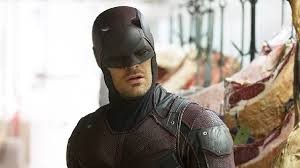Howard Andrew Jones's Blog, page 33
April 22, 2016
More Drafting Thoughts
 In writing about rough drafts the other day I realized that I breezed over an important step — outlining.
In writing about rough drafts the other day I realized that I breezed over an important step — outlining.
I’ve discussed outlining on the site before (just search through my Writing posts if you’re curious) and I’ve yet to settle on any one outlining technique that I use ALL the time. I find that different approaches work in different instances.
For instance, on the Paizo books I used very detailed outlines that went on for some 10k words. I’ve scaled that way back for the current books and right now it seems to be working. I think about the main arcs and threads, who’s in them, what the challenges are, and what happens when, jot that down to make sure I’ve got track of it, and then start drafting (this is AFTER I know who the characters are, what they want, and, particularly, what the villain wants).
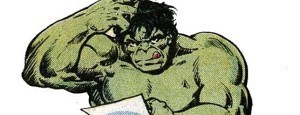 Once I get to drafting, as I mentioned, I sometimes set straight to work, having carefully thought through the individual scene before hand (so long as I know how that scene fits into the scheme of following scenes). But sometimes, if I’m feeling a little unsure, I do a present tense description of what’s happening throughout the scene, which turns into an outline of the scene, to which I later come back and add dialogue.
Once I get to drafting, as I mentioned, I sometimes set straight to work, having carefully thought through the individual scene before hand (so long as I know how that scene fits into the scheme of following scenes). But sometimes, if I’m feeling a little unsure, I do a present tense description of what’s happening throughout the scene, which turns into an outline of the scene, to which I later come back and add dialogue.
Why do I work with scenes rather than entire chapters? Well, usually one of my chapter runs from 4-6 thousand words, and 4 thousand is usually (usually) the upper limit of what I can draft on a good work day. One of my scenes, though, usually stretches from about 1.5k to 3 k, which is just about right for me to get done in a day. Lately, then, I think pretty carefully about the scene in the days leading up to it (and as I’m going to sleep the night before I write) and then can tackle it in one setting.
And if it’s not quite right, I can edit it. That’s what rough drafts are for, right? My old friend E.E. Knight told me once to give yourself permissions to let your first drafts be terrible. He emphasized just getting it down on paper (or on screen, I suppose) and then fixing it.
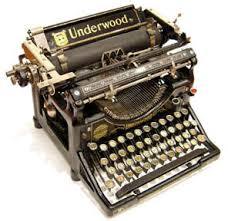 I can’t imagine what it must have been like when you were working just on typewriter with corrector ribbon, although I’m old enough that I learned to type on a typewriter and even wrote papers on them in junior high and high school. If I was writing novels in the typewriter era I suppose my writing method would have developed entirely differently, or that I’d primarily be writing in notebooks. I doubt it would be so much of the “build the skeleton, go back and add the muscle” process that’s now my go-to.
I can’t imagine what it must have been like when you were working just on typewriter with corrector ribbon, although I’m old enough that I learned to type on a typewriter and even wrote papers on them in junior high and high school. If I was writing novels in the typewriter era I suppose my writing method would have developed entirely differently, or that I’d primarily be writing in notebooks. I doubt it would be so much of the “build the skeleton, go back and add the muscle” process that’s now my go-to.
Before I sign off, I wanted to point you to some great advice I found over at the site of my friend Fraser Ronald. Everything in that article is gold.
April 20, 2016
Rough Drafts
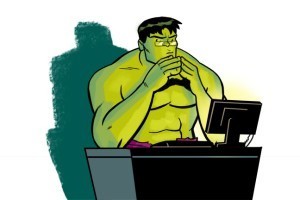 I’ve continued to experiment with rough draft methods. The goal is, naturally, to get the rough draft close so that you make as few passes as possible between rough and final.
I’ve continued to experiment with rough draft methods. The goal is, naturally, to get the rough draft close so that you make as few passes as possible between rough and final.
Sometimes I can get a scene pretty much right the first time, as happened with one chapter in my first published novel, or as happened with individual scenes since then, with increasing frequency. It’s one measure by which I can tell I’m getting to be a more proficient writer.
More often, though, a draft requires multiple passes. I aim for the former but plan for the latter. Here are the steps I’ve started following.
First, I know not only who my characters are, but what they want (also, what they think they want).
Then I outline the scene — rather, the entire novel has to be outlined in rough form. Sometimes I detail an individual scene carefully before I start, but lately I’ve just been thinking about the upcoming scene, what has to happen in it, and how to get from THIS moment to the NEXT moment. I ask myself, for instance, if they’re restating information that’s already known, or ask myself if there’s something interesting happening, or if their victory comes too easily, if the pacing feels right. All of those things and more have to be kept in mind while you’re drafting, although that stuff can obviously be tweaked during revision. (It’s better, though, to have those effects in mind while writing the rough draft.)
With the characters and scene in mind I set down to work. Sometimes that means I just start drafting in dialogue with occasional attribution, or even a stage type indicator of who’s speaking (I.E. Kirk: “Look out, Bones!” — I know stages plays don’t have quotes, but if I put quotes in now it’s one less thing I have to add later.)
I play to dialogue because I hear it easily. I use it as the skeletal framework for a scene. I usually add in a few descriptive bits as I write because I picture some key things, but I give myself permission to add as much or as little as I want during rough draft.
After I get the dialogue mostly working right I go back and add in the other details. Because I haven’t described the environment yet I can make it whatever I want once I start editing.
This isn’t at all foolproof, but it certainly seems to be working for me. It’s enabling me to draft at least 10 thousand words a week, given five normal work days, and sometimes more. If you think about that, it means a rough draft of an 80 thousand word book can be accomplished in 2 months, or a 120 thousand word book (what I’m aiming for these days) in 3.
The process is still developing; it seems like it might work for me to get 2 1/2 books a year written this way (allowing time for revisions, promotions, and an occasional break). I suppose I’ll soon learn if that’s true. The stumbling point is always how long it takes to plan a new book or series and know characters. That always seems to take longer for me than I want. I believe the first complete draft of the first book of this series, which took a year and didn’t entirely work, was me just getting to know the characters. I need to find a way to be more efficient with that. Because man, the years are just shooting by…
April 14, 2016
Breaking up is Hard to Do
I’m ending our relationship.
You have so many admirers and groupies that I’m certain my own absence will have no effect upon your feelings, but I wanted to air my grievances anyway.
I was pre-disposed to like you a lot, maybe even love you. Sure, I wasn’t a huge DD fan who owned all the Frank Miller graphic novels, but I like a good superhero comic or show and I have fond memories of reading all of my sister’s Daredevil comics. I even bought some myself back in the day.
(If anyone hasn’t seen the show yet, there are SPOILERS GALORE in the following. Be warned!)
 I can’t fault your acting. By God, even the most ludicrous scenes are handled with stunning power by your entire cast, from one-time players to the lead roles. I sincerely respect them all.
I can’t fault your acting. By God, even the most ludicrous scenes are handled with stunning power by your entire cast, from one-time players to the lead roles. I sincerely respect them all.
And I can’t fault the stunt work, which has to be some of the finest I’ve ever seen not just in a television show, but in any visual medium. The entire team deserve multiple awards for their work.
I didn’t care too much for the extreme violence or the focus on hyper-realistic brutality, but I thought hey, you’re young, it’s faddish, either you’ll get over it or I’ll just have to adjust my older sensibilities.
My problem is with the writing. It was pretty impressive most of the time through the first season. But something seems to have happened in season two. You do realize that once Frank Castle is caught that you have no true victories?
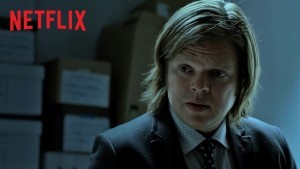 Yeah, you save the people from the dark basement where they’re caged and breeding microbes or whatever mysterious blood thing they’re doing, but it turns out that doesn’t matter, because as soon as they can, they walk back to their captors, killing at least one innocent in the process. They’re not saved, and the situation was made worse.
Yeah, you save the people from the dark basement where they’re caged and breeding microbes or whatever mysterious blood thing they’re doing, but it turns out that doesn’t matter, because as soon as they can, they walk back to their captors, killing at least one innocent in the process. They’re not saved, and the situation was made worse.
Your nurse friend has to leave her job, you break up with your best friend AND your girlfriend, and then your other girlfriend dies. And then, when she sacrifices herself so that the whole thing is over, the bad guys get her anyway!
The closest we get to a victory has to wait from, what is it, episode 3 or 4 all the way until the very end, when Stick kills the ninja president. There are no upticks. There’s little clever going on, it’s just you, Daredevil, slugging it out with ninjas in the dark. Over and over and over. Unrelieved darkness. It’s just… depressing and not cathartic. I happen to be a huge fan of Sophocles, who could write pretty grand tragedies. But he also knew you had to create a logically consistent world, and logical characters. You failed to do both.
Let me get more specific.
There are two main arcs, and they both have problems.
The Punisher Arc
 The Frank Castle storyline starts out in a promising fashion. It works really well until Fisk makes a deal with Castle in the prison. The problem is that one moment Fisk’s lawyer tells him that there’s only enough money to bribe one guard, and then — only a short time later — after Castle goes in and kills all the dudes in the cell block, suddenly oodles of guards are working with Fisk. Huh? What changed? You never explained it. Just as you never explained how it is that even MORE guards are on the payroll so that Frank can get out disguised as a guard himself. Surely, surely, there are some guards who aren’t corrupt? I mean, I’d like to believe that MOST prison guards aren’t corrupt, which would make things a lot harder on Fisk, clearly.
The Frank Castle storyline starts out in a promising fashion. It works really well until Fisk makes a deal with Castle in the prison. The problem is that one moment Fisk’s lawyer tells him that there’s only enough money to bribe one guard, and then — only a short time later — after Castle goes in and kills all the dudes in the cell block, suddenly oodles of guards are working with Fisk. Huh? What changed? You never explained it. Just as you never explained how it is that even MORE guards are on the payroll so that Frank can get out disguised as a guard himself. Surely, surely, there are some guards who aren’t corrupt? I mean, I’d like to believe that MOST prison guards aren’t corrupt, which would make things a lot harder on Fisk, clearly.
(Edit — for clarity let me emphasize that even if Fisk is positioning himself to take over the drug trade by eliminating the drug trade leader, this change is finger snap instantaneous. Before Castle kills the guys in the cell block, Fisk has one guard paid for. IMMEDIATELY after Fisk is standing there with several other guards, clearly in command.)
Even assuming that the prison is just stuffed full of the worst prison guards in the states, how did Fisk afford them? Did killing everyone on that cellblock suddenly bring Fisk a pile of cash? And when Frank escaped shouldn’t there have been a huge, messy investigation at the prison that would bring down the warden and uncover a whole bunch of corruption? Seems not, because Fisk is the prison president by the time you, Daredevil, turn back up. And when you confront him you don’t seem to have much of a plan. I thought you were clever, Daredevil. But you keep expecting to beat your way out of every problem without thinking.
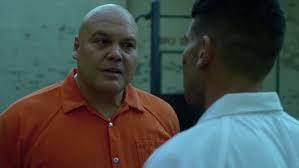 You might say that it’s all make believe and that if I buy that your truck accident gave you super powers I ought to believe Fisk can suddenly become lord of the prison. But when you’ve got people acting realistically and logically half the time, as though they’re in the real world, you really need to have them making sense the rest of the time and make them so compelling we want to believe the silly stuff. And if you introduce information imparted by a character like Fisk’s lawyer concerning the amount of available money you can’t immediately just ignore it (as you ignore some of your own powers and are inconsistent in their depiction, but I digress).
You might say that it’s all make believe and that if I buy that your truck accident gave you super powers I ought to believe Fisk can suddenly become lord of the prison. But when you’ve got people acting realistically and logically half the time, as though they’re in the real world, you really need to have them making sense the rest of the time and make them so compelling we want to believe the silly stuff. And if you introduce information imparted by a character like Fisk’s lawyer concerning the amount of available money you can’t immediately just ignore it (as you ignore some of your own powers and are inconsistent in their depiction, but I digress).
For the sake of brevity I won’t go into too much detail about other nonsense related to the Punisher plot — that his old commanding officer is, gasp, the one behind the terrible events, just feels tacked on as an afterthought. Then there’s the whole business of Karen being brought to the docks with the police — which would never have happened — and then everyone assuming that Frank must be dead because the ship is on fire. Why would they assume that because a ship’s on fire and a bunch of bad guys are dead that Frank is dead too? And speaking of that ship, how exactly did that explosion kill EVERY BAD GUY WITHIN 1000 FEET?
Lastly, what was up with the reaction shot on Matt Murdoch in the courtroom when he noticed some word passed between Frank and the guard Fisk had bribed? It definitely felt like you were setting something up that you never followed up on. But then from that point on through the season I constantly had that feeling.
The Endless Ninja Arc
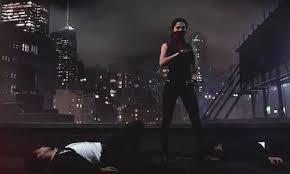 We need to evaluate the media we have with the content within it. Meaning that if I was supposed to read a bunch of graphic novels in order to follow what was going on with the ninjas you, Daredevil, failed in your storytelling. The story should make sense from the content inside, not the content outside required for understanding. This entire arc is just a mess, epitomized by the hole that’s the dramatic discovery at the end to one episode. Wow, I said upon seeing that hole, maybe things will turn around! What could that mysterious hole be?
We need to evaluate the media we have with the content within it. Meaning that if I was supposed to read a bunch of graphic novels in order to follow what was going on with the ninjas you, Daredevil, failed in your storytelling. The story should make sense from the content inside, not the content outside required for understanding. This entire arc is just a mess, epitomized by the hole that’s the dramatic discovery at the end to one episode. Wow, I said upon seeing that hole, maybe things will turn around! What could that mysterious hole be?
YOU NEVER SAY. How is that connected to Black Sky? Who the heck knows? I don’t. Am I supposed to wonder until later in some future season and be excited by the continuing mystery? If so,you’re like one of those guys who tries to convince me to read a long fantasy series by saying “It really gets good after the fourth book!” I just love guys like that.
You left me with so many questions.
How is the hole connected to Elektra/Black Sky? How are the caged microbe/blood/whatever donors connected to the immortality? How are they mind controlled on top of it?
The ninjas know where you live, Daredevil. Why didn’t they just come back in force and kill you rather than coming up with their big show-down plan? They clearly have SO MANY ninjas.
Here’s a thing — you, Elektra, and Stick all knew that The Hand could bring people back from the dead, and you knew that they were obsessed with Black Sky/Elektra. So why did you bury her when the Hand still existed? Clearly that’s so the writers could bring her back, but it makes no sense from a character perspective. Why didn’t you cremate her? If it’s because you’re Catholic, couldn’t that discussion with Stick and/or Elektra have been a fine character moment? Couldn’t Elektra have had enough foresight to say “if they kill me, burn my body?” And then the secret could be that the Hand can still regenerate a body from the ashes, if you absolutely have to bring her back.
Speaking of writers and characters, I’ve already touched upon the point that Daredevil can’t get any real victories until, maybe, at the end. You, Daredevil, also can’t get any information. There’s no slow uncovering of the secret ninja plot and how to stop it after our characters get to the hole, unless you count the sudden revelation that Elektra is Black Sky (whom the Hand were hoping to find at the bottom of a hole?) And her being Black Sky wasn’t connected to any clever deductions that all of your ninja fighting and investigation finally uncovered, it was just a surprise. Kind of like ordering the house special and getting a dead rat floating in a bowl of dish water. Surprise!
There’s no sense that the ninjas are even particularly bothered by you and Elektra because they’re just endless. You got their incubators? Well, heck, they just sent a million ninjas to the hospital (and don’t even get me started on the hospital nonsense) and took them all back. It wasn’t even a big deal if they died, because they’re immortal.
At no point do we actually know how many ninjas there are, so we never know how much any of these battles matter to you or them. I mean, tactically shouldn’t we be made to care that you’ve eliminated their top three ninjas or that there are seven elite ninjas or that THIS particular fight halted one part of their plan or… I dunno, something? So that we have some kind of sense of satisfaction? It was like Space Invaders. You kept knocking down ninjas, but they just kept coming. And everyone knows how much fun it is to watch someone else play Space Invaders.
The endless ninja fights seemed solely to exist to give us some action. I actually began to groan when more ninjas popped up. During the later episodes, my long suffering wife (who had mostly given up on you and was playing Candy Crush) would look up as I’d say: “Another ninja fight? How many ninjas are there?” Congratulations. You actually managed to make ninjas boring.
You know what, I had more points I could make about other weird choices and nonsensical stuff, but I already wasted too many hours watching you and thinking about you and now I’ve wasted 45 more minutes writing this letter. I’m done. We’re done. I hope the Luke Cage show is a lot smarter. I always liked him better anyway.
April 12, 2016
Skunked!
 I grew up a city boy. Now, as a city boy in a small mid-western city I was probably a lot more familiar with wildlife than someone born in a vast urban center, but I’m still not fully acquainted with some of the life skills you need to get by in the country, even though I’ve been living here for about twelve years.
I grew up a city boy. Now, as a city boy in a small mid-western city I was probably a lot more familiar with wildlife than someone born in a vast urban center, but I’m still not fully acquainted with some of the life skills you need to get by in the country, even though I’ve been living here for about twelve years.
Take for instance a burn pile. I’ve never maintained one properly. Despite the wife’s encouragement to burn ours sooner, it’s probably been eight years since I did anything with it. As a result, the burn pile had become a towering mass of sticks and tree limbs. Worse, the manure pile was too close. Manure, you see, is inflammable. (We have so many sticks and tree limbs because we have so many trees. In any big storm we lose a lot of branches.)
Anyway, Sunday I finally went out and started organizing the burn pile so it was safer to burn, and then I had to dig out a safety zone away from the manure. I was out there for most of the day, fairly tired and sore, and right in the final section I found a skunk! Turns out there was a little burrow hidden on the edge of the burn pile.
 The skunk sprayed the air in the vicinity rather than me, directly, but I still smelled pretty rank. I may have to throw the shoes and belt away, although numerous washings of the clothes seem to have salvaged them.
The skunk sprayed the air in the vicinity rather than me, directly, but I still smelled pretty rank. I may have to throw the shoes and belt away, although numerous washings of the clothes seem to have salvaged them.
Monday morning I knew there was a rain storm coming for an hour around 11, which I didn’t mind. I figured that since I didn’t really know what I was doing burn pile wise a huge thunderstorm would lessen the chances that I’d set the manure pile on fire, or, say, the barn or horse fence.
It all went as planned; the burn pile remained under control and continued to burn even through the downpour. Unfortunately, because I’m safety conscious, that meant that yours truly was also standing in the downpour. Even with the rain poncho, by the time I’d been out from 9 until 2:30 I was soaked to the skin. The burn pile, though, was mostly conquered. And lesson learned, I’ll not be letting the pile grow so large.
I’d thought that I’d be able to kick back and watch the burn pile, maybe read a book or take notes or something, but it turns out that A. the rain never really stopped once it got started, and you can’t do that in the rain if you care about your notebook or book and B. you really need to constantly monitor the pile and, in my case, feed it fuel from the other pile of sticks that had overflowed.
I did get in a brief phone chat with Lou Anders, who suggested that with my recent skunking and burn pile experience I should consider myself countrified. I don’t think so. There are still a number of life skills I’m pretty deficient on, farm/country wise. But I earned my merit badge now on de-skunking and burn pile control. Oh, and for the curious, the skunk had vacated his burrow long before the fire began. the next day. The scent, however, lingered.
April 6, 2016
House Rules
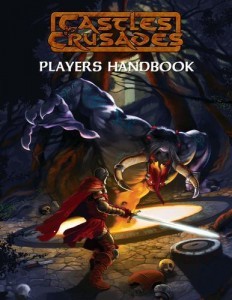 If you’re not a tabletop gamer or have no interest in tabletop gaming you should read no further unless you want to be bored or roll your eyes.
If you’re not a tabletop gamer or have no interest in tabletop gaming you should read no further unless you want to be bored or roll your eyes.
Long-time visitors are probably aware that I’ve been gaming off and on since junior high in the ’70s, when I was introduced to Dungeons & Dragons by my old friend Sean Connelly. Sometimes a couple of years will pass, but I always seem to come back to gaming, attracted by the allure of group storytelling and the camaraderie of sitting around with friends and family.
While I’ve been curious about the new edition of Dungeons & Dragons and even read through the new system books, I already had Castles & Crusades, and I remain attached to it, possibly because I’m sort of tired of learning new systems but also because it works quite well. Here’s an articulate essay on just what C&C is and how it works, if you’re curious. (I also like that you really don’t need anything more to run C&C than the Player’s Handbook and the Monsters & Treasure book. The C&C version of the DM’s guide, the Castlekeeper’s Guide, has alternate rules and add-ons, but isn’t at all necessary for running the game.)
I love how rules simple C&C is. There really aren’t very many rules, and they’re pretty consistent.
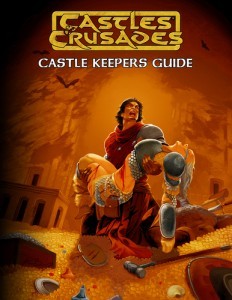 I occasionally find people who object that there are no feats or skills, but in my experience feats and skills lead to rules bloat that slows down the story. One of the reasons people play archetypes is that feats and skills are implied — and it must be said that there are many optional systems, some included in free C&C compatible products and some included in the companion volume to the series (the Castle Keeper’s Guide) that allow Advantages, which are similar to feats.
I occasionally find people who object that there are no feats or skills, but in my experience feats and skills lead to rules bloat that slows down the story. One of the reasons people play archetypes is that feats and skills are implied — and it must be said that there are many optional systems, some included in free C&C compatible products and some included in the companion volume to the series (the Castle Keeper’s Guide) that allow Advantages, which are similar to feats.
I understand C&C isn’t everyone’s cup of role-playing tea, and it’s not the ONLY system I use. You probably know that I’m a big fan of Savage Worlds, and I’ve gushed about Dungeon Crawl Classics, Barbarians of Lemuria and Whitehack without describing them in detail yet (I know, I know, I’ll get to it). But I introduced my players to C&C a few years ago and they like it pretty well, and I find that even after an absence I still recall the rules. There’s a lot to be said for that.
The only mechanics criticism of Castles and Crusades I’ve read that seemed to hold any validity was that saving throws didn’t scale as well as they should, but I found a house rule online that fixed that.
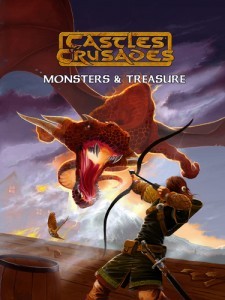 I love how easy the system is to adjust or add or subtract things to, so, for instance, I port over some abilities from other games’ versions of character classes to better fit my idea of the Barbarian class, to tweak the Rogue class, and what have you. But I also have developed a number of house rules over the years that I use in any D&D style game. And that’s the real point of this post — I’m sharing my house rules and am curious to hear about yours.
I love how easy the system is to adjust or add or subtract things to, so, for instance, I port over some abilities from other games’ versions of character classes to better fit my idea of the Barbarian class, to tweak the Rogue class, and what have you. But I also have developed a number of house rules over the years that I use in any D&D style game. And that’s the real point of this post — I’m sharing my house rules and am curious to hear about yours.
Hero Points
I don’t recall from what game we originally picked this rule up, but I’ve been awarding hero points/bennies to players for years. They allow a re-roll or a one-time bonus of +10 to a roll. Generally I award 3 hero points per game, but exceptional role-playing merits an additional in-game award of a hero point. Until I started playing Savage Worlds it wasn’t a physical effect, but I’ve grown fond of handing over little rounded stones so people have tokens to use.
Criticals/Fumbles
There are a lot of options for handling critical hits and fumbles. A critical hit is generated on a pure 20, a fumble on a 1, and in some systems a critical has to be confirmed by rolling again to see if it’s a regular hit.
I prefer heroic games, so a critical is a critical without the additional confirmation. A fumble, though, has to be confirmed not just by rolling another miss, but by rolling another fumble. That keeps the comedy and frustration lower and better simulates a good sword-and-sorcery story. How often does even young Conan ever drop his sword? I don’t recall that he does.
Dice
Using a single d20 can be kind of swingy, as any tabletop player can tell you. I got this tip from Howard Tayler at GenCon three years ago. Rather than using a D20 he suggests 2 d10, added together. I love this. Numbers resulting from a roll in the middle of the range are statistically far more common, and things at the low or high end are less likely. That makes criticals a little more rare, and makes the aforementioned fumbles even harder to generate. (You have to roll double 1s twice in a row.)
Perception
I was always a little flummoxed that there was no good Perception score. Some people use the Wisdom stat to roll for surprise and intuition, but, going back again to Conan, he seemed pretty perceptive even before he was wise.
So I just use a 7th statistic, Perception, for instances of surprise and intuition. (I tried having characters add the stat bonus to their initiative rolls, or combine that bonus with Dex and divide in half, but I think I’m just going to drop back to using Dex for initiative.)
Other Stats
Sometimes we’ve used an appearance stat, but my players and I prefer to just choose that ourselves. And I’ve seen some good write-ups on a luck stat, but we’re pretty pleased with our hero point system. Besides, seven stats seems like enough.
Experience
I’ve gotten really loose about awarding experience points. Anymore, I just tell the players when it’s time to level up and they seem fine with that. For us it’s more about the story than the number tracking.
From Pathfinder, though, I do like the idea that attribute stats can rise every few levels. It makes sense that characters can get stronger, and certainly they can get wiser! Currently I’m allowing players to choose an attribute to raise every three levels, but I might move it up to every four, depending on how this works. We have rarely played a game where the campaign lasted longer than 10th or 12th level, so every three levels is probably right. In my rpg world view, 10th or 12th level ought to be about the best you can get.
Magic
I’m not a huge fan of Vancian fire and forget magic, because that’s usually not the way it works in the fiction I love. Instead I’m using the optional Mana rules from the Castles & Crusades Castlekeeper’s Guide. The basic concept is that at each level, a spell user has so many Mana points per day. Casting a 0 level spell costs one point, casting a 4th level spell costs 5. You get the idea.
I play that the characters are allowed to throw spells at their level or lower with no problem. They’re also allowed to try to throw spells they know that are over their level, rolling against the statistic that they use to power their magics (usually Intelligence). But for ever level over their own they get a -1 from the roll. So far this is working nicely, and it means there’s an occasional backlash, which I’ve partly modeled off of old Talislanta and partly off of Dungeon Crawl Classics.
Of course learning these spells is a trick. They don’t just get them out of the air — they have to be found, taught, or meditated over, etc. depending upon what kind of spellcaster the player has created.
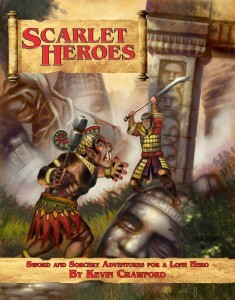 Traits
TraitsI love all kinds of mechanical ideas and settings created by Kevin Crawford (he’s a brilliant game designer and writer, which is why I have hard copies of most of his game systems). Because he writes for Labyrinth Lord/Swords &Wizardry/ old school roleplaying games, all of his ideas work well with Castles & Crusades.
One idea I’m quite taken with is the concept of traits, which he introduced in his Scarlet Heroes book. He writes that with a trait you use “a few words to describe something the character has been or is good at doing.” Maybe your fighter is an excellent hunter, or maybe your non bard actually is a great singer. Those are all character bits, of course, but a trait allows you to drop a few points into that characteristic (the more specific, the better) to be able to roll to succeed on something that makes your character unique. Only a few trait points are awarded at creation and with each level.
They’re not meant to be feats, or skills, although from my examples you see that they also can be used to add a little non-class customization to a character. They also can be indicative of background, like, “three years apprenticed on a ship” or of a little bit of character oomph: “iron constitution.” There’s no codified list, just an agreement between player and GM about what the trait will mean and a discussion when the player wants to use it.
I haven’t tried using traits yet, but I’m attracted to the idea. Freeform and fun is good, rules bloat is bad.
Alright — that’s what I have. I’ll be very curious to hear if anyone else has some favorite house rules!
April 5, 2016
Hard Writing Lessons 6 – Head Games
 I’ve been writing fiction since I was in grade school, and I noticed the other day that my first published novel hit the bookstores in 2009, which is a lot further back than I realized. Yet I don’t remotely feel like I’ve “figured it all out.” I’m still re-learning a lot of lessons even as I learn new ones. To be a good writer, I think you have to constantly pay attention to story structure and characters not only in chosen genres but in others as well, not to mention other media… and then there’s studying human nature and history and… well, I could digress, but let me get this back on point.
I’ve been writing fiction since I was in grade school, and I noticed the other day that my first published novel hit the bookstores in 2009, which is a lot further back than I realized. Yet I don’t remotely feel like I’ve “figured it all out.” I’m still re-learning a lot of lessons even as I learn new ones. To be a good writer, I think you have to constantly pay attention to story structure and characters not only in chosen genres but in others as well, not to mention other media… and then there’s studying human nature and history and… well, I could digress, but let me get this back on point.
Yesterday I was revising a scene about 30 thousand words into the next book right after I’ve switched to a new point of view character. He’s not new to the readers, but we’ve never had his PoV and we haven’t seen him yet in THIS particular book. So naturally I started with him alone and in the middle of a sort of self-assessment to get readers up to speed about what he’s doing now and what he’s thinking about.
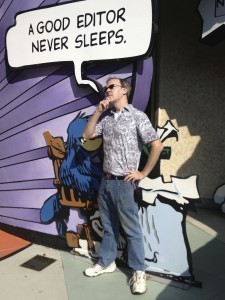 It mostly worked, and I polished it up, but it still felt off. I kept thinking about it through the course of the evening and as I drifted off to sleep and it finally came to me. No drama. The scene would be FAR more interesting to read if my character’s talking with someone in a way that’s revealing both of his character and that of the person he’s talking with. It seems so obvious now. I can hardly wait to sit down and re-draft the scene this morning.
It mostly worked, and I polished it up, but it still felt off. I kept thinking about it through the course of the evening and as I drifted off to sleep and it finally came to me. No drama. The scene would be FAR more interesting to read if my character’s talking with someone in a way that’s revealing both of his character and that of the person he’s talking with. It seems so obvious now. I can hardly wait to sit down and re-draft the scene this morning.
Of course, this wouldn’t work if I didn’t know the characters quite well — I might end up with two cardboard cut-outs parroting information to one another. I call those “as you know, Bob” scenes, where information is conveyed to the reader in an artificial way disguised as conversation. It’s one flavor of what’s known as an info dump. The trick to avoid THAT is making the information something that the characters would honestly be discussing, now, and to filter what they’re saying through their own outlook and personality. I’m going to sign off and see if I can make that happen.
April 1, 2016
Hard Writing Lessons 4 — Word Count
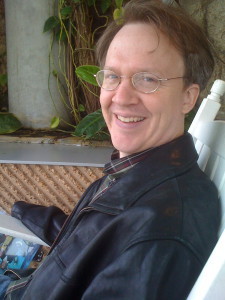 I’ve been busy drafting the new novel but not very busy blogging. When things are going smoothly it’s easy to whip up a quick blog post and still get an 2000 words, but when things are a little more challenging — or when there are a bunch of errands to take care of over the course of the day — getting that 2000 words in AND a blog post becomes an either/or, in which case the blog post always comes in last. You understand. The blog is for fun. The writing is supposed to be fun too, but it’s also the job.
I’ve been busy drafting the new novel but not very busy blogging. When things are going smoothly it’s easy to whip up a quick blog post and still get an 2000 words, but when things are a little more challenging — or when there are a bunch of errands to take care of over the course of the day — getting that 2000 words in AND a blog post becomes an either/or, in which case the blog post always comes in last. You understand. The blog is for fun. The writing is supposed to be fun too, but it’s also the job.
I’m often asked how many words I try to get in a day, or how many pages. 5000 words is about 20 typewritten double-spaced pages, and 2k is approximately 8. If I’m really on a roll and know exactly what my characters are doing (and I have NO interruptions) I can get 5k. I have trained myself to be okay with 2k, and even the occasional 1k if it’s a tough day or one with interruptions.
 However, any more I worry less about the daily word count than I do the weekly or even monthly. I’m trying to get at least 40,000 every month, or 10 k every week, which means at least 2k every work day. If I suddenly have to take care of the barn for a few hours, or there’s some kind of family emergency then I have to satisfy myself with a lower word count for the day, counting on my ability to often write 3-4k or to write some weekend morning to take care of the deficit.
However, any more I worry less about the daily word count than I do the weekly or even monthly. I’m trying to get at least 40,000 every month, or 10 k every week, which means at least 2k every work day. If I suddenly have to take care of the barn for a few hours, or there’s some kind of family emergency then I have to satisfy myself with a lower word count for the day, counting on my ability to often write 3-4k or to write some weekend morning to take care of the deficit.
That 40k a month isn’t really accurate for every month. For instance, I just finished a week and a half to two weeks in editing mode on book 1 of the new series. I’ve no idea what THAT word count was and it doesn’t matter. The important point during editing phase is to make the story work well and to polish it. I really only worry about page count when I’m in first draft mode. I need to get it down on paper before I can start tinkering. What may sound good in outline form doesn’t always translate because I may write something like “this relationship begins to develop” and on paper it doesn’t happen, or seems artificial — and that might change what I’ve been planning to write for the day and leave me staring at the screen a lot.
 Still, you have to have some kind of idea of where your characters are going even if you’re not an outliner (I am, but some writers aren’t). Probably even more importantly you have to know who your characters are. Not just their names, but what they WANT and what they THINK they want. Their strengths, weaknesses, tools, and limitations. And other stuff besides.
Still, you have to have some kind of idea of where your characters are going even if you’re not an outliner (I am, but some writers aren’t). Probably even more importantly you have to know who your characters are. Not just their names, but what they WANT and what they THINK they want. Their strengths, weaknesses, tools, and limitations. And other stuff besides.
I could probably go back through this and tighten it up or reach some sort of grand conclusion, but I’ve got some words to write. Hope this was helpful. Have a Happy April Fool’s Day and don’t pull any mean pranks.
March 23, 2016
Link Day
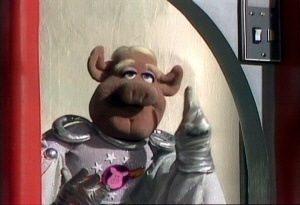 I’ve grown increasingly frustrated with pacing and plotting in the new season of Daredevil, and I’ll probably put my thoughts into print for Friday after I finish watching the final two episodes. The amount of stupid that was suddenly injected into the plot can’t be overcome by the deft acting, and my suspension of disbelief has been completely destroyed. Sure, it’s a superhero show, but it goes out of its way to make things gritty and “real” so some of the things it’s asking viewers to believe defy logic.
I’ve grown increasingly frustrated with pacing and plotting in the new season of Daredevil, and I’ll probably put my thoughts into print for Friday after I finish watching the final two episodes. The amount of stupid that was suddenly injected into the plot can’t be overcome by the deft acting, and my suspension of disbelief has been completely destroyed. Sure, it’s a superhero show, but it goes out of its way to make things gritty and “real” so some of the things it’s asking viewers to believe defy logic.
For now, though, I’m behind schedule today and need to get to work, so here are some interesting links.
 First, a neat article from National Geographic about some hidden World War I Alpine emplacements becoming visible due to ice melting.
First, a neat article from National Geographic about some hidden World War I Alpine emplacements becoming visible due to ice melting.
Second, a link to a Kickstarter for a new role-playing setting/system from the immensely talented Kevin Crawford, the mastermind behind many of the best independent old school books in the last years, including Stars Without Number and Red Tide, both of which I’ve discussed previously on the site.
Third, a link to a fundraising campaign for a new season of Star Trek Continues at Indie Go Go.
Fourth, out of the deep blue floats a nice review of Beyond the Pool of Stars, my most recently published novel. I had hoped that with TOR involved in distribution that this book would be better reviewed and discussed, but then it’s a tie-in novel, which are never particularly well reviewed. I’ve been sad to see that it’s pretty much been invisible except for one or two other reviews.
Fifth, if you were interested in Nemo’s War from Victory Point Games but were too late for the Kickstarter, for a limited time you can still pre-order a copy that has most of the Kickstarter goodies.
Right — that’s all I have time for. I have to feed the horses and get back to writing.
March 21, 2016
Last Friday I mentioned that I was reading a Viking serie...
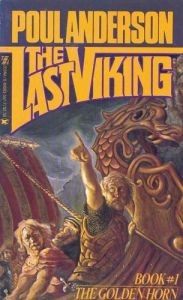 Last Friday I mentioned that I was reading a Viking series about Harald Hardrada by Poul Anderson, but failed to mention the title. This is The Golden Horn, the first of three books about the hero. I’m still kept at arm’s length, but the tone is growing from me. In talking with my good friend Chris Hocking about it he asked whether there wasn’t a bit of a feel from the sagas in it, and I assented that there was, and I think that the tone grew on me. I’m not sure I’ll immediately jump up and read the next of the books, but I ended up enjoying it.
Last Friday I mentioned that I was reading a Viking series about Harald Hardrada by Poul Anderson, but failed to mention the title. This is The Golden Horn, the first of three books about the hero. I’m still kept at arm’s length, but the tone is growing from me. In talking with my good friend Chris Hocking about it he asked whether there wasn’t a bit of a feel from the sagas in it, and I assented that there was, and I think that the tone grew on me. I’m not sure I’ll immediately jump up and read the next of the books, but I ended up enjoying it.
I still haven’t finished reading my pulp anthology, but as most of my reading has been taking place while I am waiting for my daughter to come out of school or finish some after school activity, I haven’t wanted to bring a fragile old book/pulp along, or drag a laptop to read an e-book (I don’t have a Nook or Kindle, just an emulator on the Macbook).
I finally watched Jessica Jones last week and found it terrifically well-written and acted, and my wife and I are about halfway through the second season of Daredevil and so far I find it the same. I don’t understand why these shows have so much “torture porn” though. Maybe it’s supposed to help make superhero shows feel more realistic? I think in its own way that kind of violence might do its own part to desensitize viewers to it. I think I’d prefer less realistic/graphic depictions.
Work continues apace with all my writing projects, but there won’t be any new books from me on the shelves for months and months to come, so it might look like nothing’s happening. If all goes well, the new series should have books following one another in swift succession. If you’re only watching the bookstore, though, you might be wondering “hey, whatever happened to that Howard Andrew Jones guy?”
March 18, 2016
Empires in America
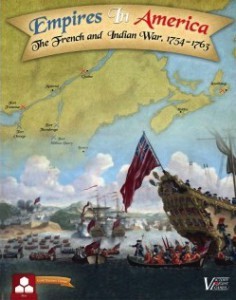 I spent so much time drafting a review of a great solitaire war game at Black Gate this morning that I don’t have time to spare for much of a blog post on my own site. If you have any interest in solitaire gaming, particularly at the strategic level, you ought to pick up Empires in America from Victory Point Games. Details are here.
I spent so much time drafting a review of a great solitaire war game at Black Gate this morning that I don’t have time to spare for much of a blog post on my own site. If you have any interest in solitaire gaming, particularly at the strategic level, you ought to pick up Empires in America from Victory Point Games. Details are here.
I know that I promised I’d be reading some modern stuff, much of it by people I know, but on the way out the door or over breakfast I keep grabbing something from my “I should have read this sooner” pile. So I’ve recently finished de Camp’s Dragon of the Ishtar Gate and I’m most of the way through the first of Poul Anderson’s three paperbacks about the exploits of that famous Viking, Harald Hardrada.
Dragon of the Ishtar Gate ended up being a lot more fun than I expected. All of the historical details were extremely vivid, the pacing was solid, and the action scenes were strong. I wasn’t ever truly captivated, but it kept me interested throughout. I’m just a little cooler on the Poul Anderson novel, which at times feels like I’m kept a little too much at arm’s length. Still, I’ll probably finish it, and I may read the other two though not in any great hurry. I have two more of de Camp’s historicals, and I liked Dragon of the Ishtar Gate well enough that I’ll probably try more.
Howard Andrew Jones's Blog
- Howard Andrew Jones's profile
- 368 followers


